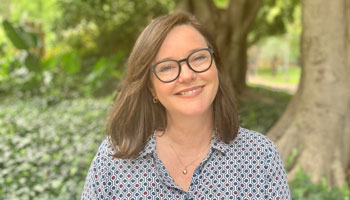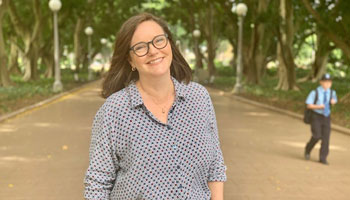AISNSW's Samantha Kourakis began her career as a music teacher but her pathway took a major turn early on so she could better support students in their learning.
Educators build careers for themselves in diverse ways, sometimes through influences far outside their domain, and yet through fate or passion, they create their life’s work.
For Samantha Kourakis, being employed in a highly complex school in a remote town in South Australia, fresh out of university, led her on a pathway vastly different from the Music teacher she had trained to be.

Samantha Kourakis, AISNSW's new Wellbeing Consultant in the Professional Services team.
“In those complex schools, I wasn’t even going to get them through the classroom door. It meant that I had to reframe in my own mind everything I had learned about teaching.”
“My very first roles taught me that unless I looked after my students’ wellbeing and unless I built good relationships; unless I looked after my own wellbeing, I wasn’t going to be able to support my students to learn,” Sam says.
“In those complex schools, I wasn’t even going to get them through the classroom door. It meant that I had to reframe in my own mind everything I had learned about teaching.”
Sam, who began at AISNSW recently as a Wellbeing Consultant in the Professional Services team, has made it her life’s mission to understand how to best support students to ensure they thrive in their learning. Her focus is on building the capacity of classroom teachers in the areas of wellbeing and social and emotional learning (SEL) through the delivery of professional learning and the development of resources.
“Schools know if they get wellbeing right, they really do improve the outcomes for their students - both academic outcomes as well as wellbeing and mental health outcomes.
With an education journey that has encompassed a social sciences degree, a psychology degree with honours, and roles from classroom teacher to school counsellor to school executive, her drive has been the understanding that all teachers have a role to play in student wellbeing by building stronger connections with students and their parents and carers.
“We are all teachers of wellbeing. We may specialise in Maths or Science but we cannot teach without having a relationship with our students.
“Every conversation can contribute to building a child’s awareness of themselves and others, of teachers knowing the importance of teaching empathy. Every conversation with students could be either a relationship builder or relationship divider.”
“It is about fairness and equity - that all students, no matter who they are and where they come from, have that right to be really engaged in their education and their school communities.”

One of Samantha's passions lies in supporting schools with restorative practice.
In her most recent role before joining AISNSW, Sam was Dean of Students at a large co-education NSW independent school. During 12 years at the school, Sam witnessed the transformation of wellbeing from having a fringe status to being underpinned with scientific evidence and integral to the school’s strategic plan. Linking wellbeing to the school community’s underlying values and ethos, and building teacher capacity were fundamental to this development, she says.
“Schools know if they get wellbeing right, they really do improve the outcomes for their students - both academic and wellbeing and mental health outcomes.
“Evidence from the literature shows that if we have good relationships with our students, if our students feel a sense of connectedness and belonging to not just their studies but to the adults and the staff in the school, then the teaching and learning outcomes for those students will be improved.
While at the school, Sam worked with staff to integrate the SEL capabilities into their subjects and to transfer these opportunities to the everyday interactions they had with their students and families.
“Every conversation can contribute to building a child’s awareness of themselves and others, of teachers knowing the importance of teaching empathy. Every conversation with students is a relationship builder or could be a relationship divider.
“When they are coming in and out of the classroom or when they’re coming from the sports field or in the corridor … every conversation matters.
“Our job is to model and guide SEL learning but also there are times when we explicitly teach SEL, which is just as important as when we explicitly teach maths or reading or spelling,” she says.
“Wellbeing used to be focused on this idea that life was always going to be happy but now there is the acceptance that life has its ups and downs and that we as educators in schools can give students the attitudes, the skills and the understandings not only to accept and cope with setbacks but also to thrive and flourish.”

Positive influences at school are protective factors for students.
During 2021, Sam is developing professional learning for school educators in areas including SEL, restorative practice and Circles, a pedagogy for teaching students about healthy relationships.
“I’m really passionate about restorative practice and the importance of teaching young people empathy – recognising that what they do can affect others but also knowing there are always pathways to restore and repair relationships after there has been a problem. This is really at the heart of school communities,” she says.
"Whole-school support of student wellbeing must include the expertise and insight of school counsellors."
Sam is also working at AISNSW to support school counsellors operating in NSW independent schools including the development of the upcoming AISNSW School Counsellors Conference, a two-day virtual event.
“I recognise the real specialist training they bring. Whole-school support of student wellbeing must include the expertise and insight of school counsellors,” she says.
Sam says the golden thread throughout her career so far is the recognition of the impact school communities can have on the development of young people’s lives.
“The importance that no matter what the school community looks like, or how complex they are, they still can influence positively how children feel about themselves and view the world and their relationships.
“It can be really protective for them and their wellbeing as they graduate and I’m really passionate about the fairness of that for them.”
Upcoming Wellbeing learning experiences
An Introduction to Social and Emotional Learning – webinar – 24 March
An Introduction to Circles for Social and Emotional Learning – webinar – 27 April
A Practical Approach to Social and Emotional Learning – webinar – 5 May
Supporting Children’s Friendships and Social and Emotional Competencies – webinar – 21 July
An Introduction to Restorative Practice in Schools – webinar – 31 August
New to AISNSW and want to receive AISNSW Education News updates? Click here to register, and select ‘AISNSW Education News’ on the Areas of Interest/Subscriptions page.